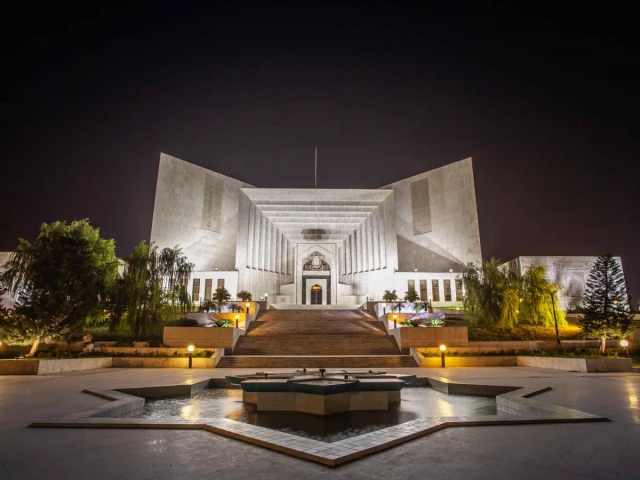ISLAMABAD:
The SC on Wednesday resumed hearing the case challenging the 26th constitutional amendment, during which members of the eight-judge constitutional bench questioned the extent of their jurisdiction.
The hearing, presided over by Justice Aminuddin Khan, focused on objections raised regarding the constitution of the tribunal formed to hear appeals against the 26th Amendment. The proceedings were marked by lively exchanges between the judges and the applicant’s lawyer on the limits of judicial authority and the need to refer the case to a full court.
Justice Shahid Bilal Hassan observed that the petitioner was seeking relief related to the main case through the present plea. He said the lawyer was asking the court to turn a blind eye and ear and grant relief regarding the 26th Amendment without looking at the jurisdictional issue.
The judge pointed out that the first hurdle was the question of jurisdiction which had to be overcome before going any further. He asked how a court that could not hear the case could send it to a full court.
Justice Jamal Mandokhail observed that the impression was created as if some judges were on one side and others on the other. He said Supreme Court justices had three duties: to defend, protect and interpret the Constitution.
He added that if all the judges in the court were not accepted collectively, the case could not move forward. He further noted that the perception of division within the judiciary was dangerous and stressed that the court’s work was bound by constitutional responsibility and not personal opinions.
During the proceedings, Khawaja Ahmad Hussain, the lawyer for former senator Afrasiab Khattak, presented his arguments, saying he would present reasons in favor of the case being heard by a full court. He argued that the credibility of the institution did not depend on the 26th Amendment and said the matter should be heard by another independent bench.
However, Justice Mandokhail asked the lawyer if he did not have confidence in the current judiciary. The lawyer responded to this that the decision under section 191 should be taken by the original plenary.
Justice Hasan Azhar Rizvi noted that the words “original full court” were not mentioned in the lawyer’s plea. The lawyer responded that he did not mean that the current judiciary was not independent.
Justice Mandokhail then observed that since the lawyer had stated that the matter should be heard by another “independent bench”, the question arose whether the same judges would be part of that bench.
Justice Aminuddin Khan asked whether the Chief Justice would be included in such a bench, and the lawyer asserted that he would. Justice Mandokhail then wondered how the bench could pass an order if it could not hear the matter itself.
The lawyer argued that the newly appointed judges could be included in the decision and questioned why the court was seeking a way to issue an order when the federal government had not raised any objection to forming a full court or passing an order on the issue.




